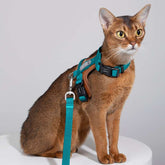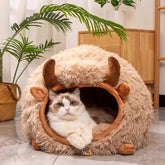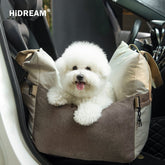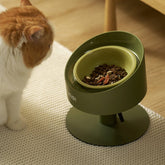A Comprehensive Guide to Choosing the Best Cat Litter

Selecting the right cat litter is essential for maintaining a clean and comfortable environment for your feline companion. With numerous options available, it can be overwhelming to determine which litter will suit your cat's needs while also aligning with your preferences, time constraints, and budget. In this article, we will explore the various factors to consider when choosing cat litter and provide valuable insights to help you make an informed decision.
Factors to Consider When Choosing Cat Litter
Clumping or Non-Clumping Cat Litter
When it comes to clumping versus non-clumping cat litter, there are several considerations to keep in mind. Clumping cat litter, typically made with bentonite, offers advantages such as superior liquid absorption, ease of cleaning, and reduced plastic contamination. It is an ideal choice for older cats and simplifies litter box maintenance. However, clay-based litter can be dusty and non-biodegradable. On the other hand, non-clumping litter, often composed of baking soda or charcoal, is useful for odor control but may require more frequent cleaning and can be challenging to maintain.
Scented or Unscented Choices
While scented litter may help mask unpleasant odors, it's important to consider your cat's preferences and sensitivity to scents. Cats have a highly developed sense of smell, and certain scents can be repellent to them. It is advisable to opt for litter that eliminates odors rather than simply masking them. If your cat shows any signs of respiratory issues or discomfort, unscented litter is a safer choice. Regular cleaning of the litter box is crucial regardless of the type of litter used.
Dust-Free Cat Litter
For individuals with allergies or asthma, dust-free cat litter is recommended. Although some litter brands claim to be dust-free, it may be necessary to try different types to find the most suitable option for both you and your cat. It's also important to monitor your cat's response to different litters, as they may develop allergic reactions.
Consider Your Cat's Comfort
Cats naturally gravitate towards fine sand-like textures for their litter. Opting for litter with a similar texture, such as fine-grain or clay-based litter, can enhance your cat's comfort and encourage proper litter box usage. If you have a declawed cat, it is advisable to choose a gentle litter to prevent any aversion to the litter box.
Number of Cats Using the Litter Box
If you have multiple cats, each may have their litter box preferences. While one cat may prefer a specific type of litter, another may feel uncomfortable using it. It's important to provide separate litter boxes tailored to individual preferences to ensure all cats have a positive litter box experience.

Types of Cat Litter
Clumping Clay Cat Litter
Clumping clay litter, made from bentonite clay, excels in absorbing liquids and reducing odors. It offers convenience and durability, requiring less frequent replacement. However, it is not recommended for kittens under six months due to the risk of ingestion and potential health issues. Tracking and dust may also be a concern with this type of litter.
Non-Clumping Clay Litter
Non-clumping clay litter is an excellent alternative for reducing odors in the litter box. It is safe for cats of all ages and is less dusty, making it suitable for cats and owners with respiratory problems. However, it is not biodegradable and requires more frequent cleaning.
Corn-Based Cat Litter
Corn-based cat litter is environmentally friendly and biodegradable. It offers good clumping capabilities compared to clay litter and can be easily disposed of by flushing. However, it may produce dust, which can be harmful to pets and individuals with allergies. Mold growth and aflatoxins can also affect its clumping abilities.
Silica Gel Cat Litter
Silica gel litter, consisting of absorbent crystals, effectively controls odors and minimizes dust. It is a durable option but tends to be pricier than other alternatives. The rough texture of the crystals may not be suitable for young kittens or older cats with sensitive paws. Large consumption of silica gel litter can also pose health risks.
Walnut Cat Litter
Walnut cat litter, made from crushed walnut shells, is highly absorbent and offers excellent odor control. It is available in different textures to accommodate cats with sensitive paws. While it is environmentally friendly, dust may be a concern for both cats and owners.
Pine-Based Cat Litter
Pine-based litter is derived from pine sawdust and undergoes a heat treatment process to remove oils and allergens. While it clumps well, it primarily masks odors rather than effectively controlling them. For enhanced odor control, consider using deodorizers or pet odor purifiers in conjunction with pine litter. These products can help neutralize and eliminate unpleasant smells. Keep in mind that pine litter may still require additional odor control measures.
Paper-Based Cat Litter
Recycled paper-based cat litter is a suitable choice for environmentally conscious individuals. It is dust-free, unscented, and absorbent, making it ideal for cats with sensitive skin or injuries. However, frequent replacement and cleaning are necessary since it does not effectively control odors.
Wheat Cat Litter
Biodegradable wheat cat litter offers effective odor control and is eco-friendly. It is also an affordable option. However, it can produce a significant amount of dust, making it unsuitable for allergic cats and owners. Aflatoxins, which can be fatal to cats, can develop in wheat-based litter.
Grass Seed Cat Litter
Grass seed litter, typically available as clumping or non-clumping varieties, is lightweight and biodegradable. It provides a faint scent and is gentle on sensitive paws. However, it tends to be more expensive than other types of litter and may be challenging to reduce tracking.

Is Cat Litter Safe?
Cat litter is generally safe for cats; however, it should not be consumed. Clumping litter, in particular, can cause gastrointestinal problems if ingested. It is crucial to keep litter away from dogs as well, as they may be tempted to eat it.
Conclusion
Choosing the right cat litter is essential for maintaining a clean and comfortable litter box environment. By considering factors such as clumping or non-clumping litter, scented or unscented options, dust-free properties, and your cat's comfort, you can make an informed decision. Additionally, exploring the various types of cat litter, such as clumping clay, corn-based, silica gel, and others, will help you select the most suitable option for your cat's needs. Remember, maintaining a consistent litter box routine and providing options tailored to individual preferences will ensure a positive experience for both you and your feline companion.























